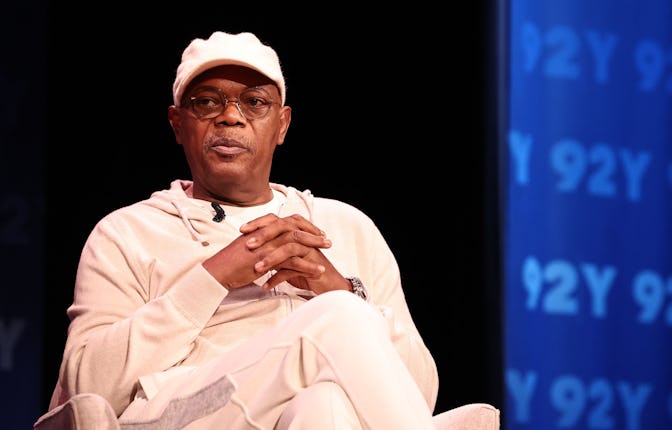How Samuel L. Jackson's latest role forced him to confront his mortality
The legendary actor is getting honest about what scares him.

In a new interview with I News, Samuel L. Jackson gets incredibly candid about what motivates him in his current chapter of life and career. Decades of being a legendary thespian on both the stage and the screen have wisened and weathered the star just a bit. “I’m getting older every day,” he admitted to the magazine. “I know a lot about getting old! I have been around for a while.” Jackson’s no longer the foul-mouthed badass with spicy one-liners like he was in films like Pulp Fiction and Jackie Brown (even though he still can be whenever he wants). He’s now actively confronting his fears of mortality in the more somber roles he’s choosing.
In his new show for Apple TV+ airing March 11, The Last Days of Ptolemy Grey, he explores the realities of dementia as the 93-year-old protagonist who’s been abandoned by society and family alike. The six-episode show was adapted from Walter Mosley’s novel and produced by Jackson and his wife, LaTanya Richardson. But for Jackson, the role was personal. Both his mother and his grandfather suffered from Alzheimer’s, and he admits he fears the same fate sometimes. Jackson recalls, “As they passed on, I just became more determined to tell this story and get it out there. And make sure people understand that the people they loved are still there, inside that person, so you can’t throw them away. You have to care for them and love them as if they’re still contributing to your life.”
Jackson has the biggest grossing box office take-in of an actor of all time, coming in at $27 billion currently — and yet, he’s never won an Oscar. He’s given performances so moving that awards have been resurrected just to be given to him: the Cannes Film Festival jury honored his 1991 role in Spike Lee’s Jungle Fever with the award for Best Supporting Actor, reviving the award after retiring the award ten years earlier. But the Academy has refused to acknowledge his work, outside of one nomination for his 1994 role in Pulp Fiction. He will be given an honorary Oscar this month, but doesn’t seem to give the awards much credit. He doesn’t think they necessarily further actors’ careers, and that they fail to praise the high grossing films that buoy the industry. “They should have an Oscar for the most popular movie,” he insisted. “Because that’s what the business is about.”
Jackson is also quick to downplay his rich resume of characters. “I don’t do a lot of cinematic character studies,” he said. “... I tend to do popcorn movies and movies that I would have gone to see when I was a kid, movies that make me happy. Because, I think, people go to the movies to be drawn into the joy and excitement of life.” But with theater roles like his 2011 turn as Dr. Martin Luther King Jr. in The Mountaintop and darker roles in films like 2002’s Changing Lanes or 2012’s Django Unchained, that take on his own career feels a bit modest. But perhaps modesty is part of getting older. It certainly feels like this current role as Ptolemy Grey will be the opposite of popcorn fare. And like all of his chapters that have come before, Samuel L. Jackson is sure to have an eager audience for whatever he chooses to do in this new paradigm.